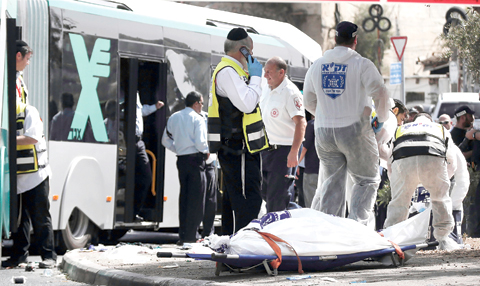Israeli Zaka volunteers stand next to a body following a Palestinian shooting attack on a bus in the east Jerusalem Jewish settlement of Armon Hanatsiv, adjacent to the Palestinian neighbourhood of Jabal Mukaber, yesterday. Two Palestinian attackers opened fire on a bus while another assailant carried out a car and knife assault in Jerusalem, leaving two people dead and five wounded in two separate incidents, Israeli authorities said. — AFP
JERUSALEM: Palestinian men armed with knives and a gun killed at least three people and wounded several others in a string of attacks in Jerusalem and near Tel Aviv yesterday, police said, on a "Day of Rage" declared by Palestinian groups.
With the worst unrest in years in Israel and the Palestinian territories showing no signs of abating, Prime Minister Benjamin Netanyahu called a security cabinet meeting for 3 p.m. (1200 GMT) to discuss what police said would be new operational plans.
Officials said Israel's public security minister was considering whether to seal off Palestinian neighbourhoods in East Jerusalem, home of many of the assailants of the past two weeks, from the rest of the city.
Unlike their brethren in the occupied West Bank, Palestinians in East Jerusalem can travel in Israel without restrictions. Israel annexed East Jerusalem after a 1967 war in a move that is not recognised internationally. Adding to a growing sense of Israeli public insecurity, two Palestinians shot and stabbed passengers on a bus in Jerusalem, killing two and injuring four, police said. One of the assailants was killed, an ambulance service spokesman said, and the other captured.
"We don't know what to do, or where to walk," Avi Shemesh, a witness to the attack, told reporters. "They are Israel-haters and they need to be eliminated."
Minutes later, another Palestinian rammed his car into a bus stop in the centre of Jerusalem, then got out and began stabbing pedestrians, killing one and wounding six, police said. They said the attacker had been "neutralised", without saying what this meant.
Seven Israelis and 27 Palestinians, including nine alleged attackers and eight children, have died in almost two weeks of street attacks and security crackdowns.
The violence has been stirred in part by Muslim anger over increasing Jewish visits to the al-Aqsa mosque compound in Jerusalem, Islam's holiest site outside the Arabian Peninsula.
RUSH HOUR ATTACK
In Raanana, just north of Tel Aviv, a Palestinian man stabbed and lightly wounded an Israeli on a shopping street during the morning rush hour, officials and witnesses said.
Amateur video distributed by police showed several men kicking and beating the alleged assailant as he lay on the ground. The ambulance service said he was seriously hurt.
A shopkeeper said that, after hearing shouting, he had grabbed a heavy wooden umbrella and run outside to confront the assailant. "He started stabbing the guy. I hit him a couple of times and kicked him and the knife flew out of his hand," the store owner said. "I wish I had had a gun - I would have shot him."
Within an hour of that incident, another Palestinian stabbed and wounded four people in Raanana, police said. The main Palestinian factions, including the Western-backed Fatah movement and the militant Hamas group, declared a "Day of Rage" yesterday across the West Bank, Gaza and East Jerusalem, accusing Israel of "escalating its crimes against our people" and carrying out "summary executions".
The leaders of Israel's Arab community called for a commercial strike in their towns and villages. The now-daily stabbings have raised speculation that Palestinians could be embarking on another uprising or intifada, reflecting a new generation's frustrations over their veteran leadership's failure to achieve statehood.
Palestinians also see increasing visits over the past year by Jewish groups and right-wing lawmakers to the al-Aqsa plaza, revered by Jews as the site of two destroyed biblical temples and Judaism's holiest place, as eroding Muslim religious control of the compound.
Netanyahu has said repeatedly that he will not allow any change to the status quo under which Jews are allowed to visit the site but non-Muslim prayer is banned, but his assurances have done little to quell alarm among Muslims across the region. - Reuters



